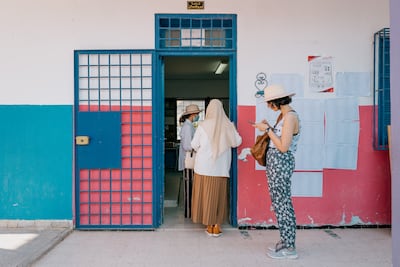Tunisians voted to support a new constitution that strengthens the powers of President Kais Saied in a referendum that brought a record low participation rate, the electoral commission announced on Tuesday.
Results showed 94.6 per cent voted to change the constitution with just 5.4 per cent against the move.
Just 30.5 per cent of the country’s nine million eligible voters took part - 2.6 million - representing the lowest number of Tunisians to take part in a ballot since the country's 2011 revolution.
Most of the country's political parties and civil society organisations boycotted the referendum, considering it to be illegitimate.

Exit polling by Sigma suggested that nearly equal numbers of Tunisians voted yes as those who voted no or boycotted it, while 54 per cent of eligible voters did not take part for other reasons.
Mr Saied hailed the projected victory late on Monday night as he walked down Avenue Habib Bourguiba amid throngs of supporters.
“We will meet the hopes of all Tunisians everywhere so that the people take back their sovereignty and thrive through true democracy not a formal one,” he told the crowd.
“We will prosecute all those that committed crimes against the people and we will not leave a single millime [a unit of the dinar] from the money they stole on the table.”
Chokri Hellal, 54, was among those celebrating.
“I was waiting for this moment,” he said. “This is the result of 11 years of struggle, of people who were unable to meet the responsibility that was handed to them and who only thought about themselves and personal gain.”
Kaouther Mouldi, 41, who joined the crowds of supporters in their late-night revelry, said: “I’m very happy. I feel like flying. After 11 years of poverty, terrorism and ruin we finally took back our Tunisia; we took back our mother.”
Other Tunisians mourned the loss of what they said were the great gains made since Zine El Abidine Ben Ali was overthrown in a popular uprising in 2011.
Opposition parties were defiant on Tuesday, saying the record low turnout was a blow to Mr Saied, not a victory.
Ahmed Najib Chebbi, the leader of a coalition of opposition parties called the Salvation Front, said the 75 per cent non-participation rate was a clear indicator that “the president has to leave his seat; he no longer has any excuse to remain in power”.
“He needs to empty his seat and call for a presidential and parliamentary elections so that peace and stability are restored,” he said at a press conference early on Thursday.
He also cited what he said were irregularities in the vote that could further undermine the result.
“The numbers released by the electoral commission are exaggerated and do not match what was observed by both citizens and national and international observers,” he said.

Mr Saied took control of the independent election commission this spring, replacing many of its top officers.
Irregularities and breaches of election rules — including a speech given by the president inside a polling station early on Monday, breaking the ban on campaigning on election day — were reported throughout the day.
The new charter replaces the first democratically drafted constitution in the Arab world, which was composed and ratified by an elected constituent assembly in 2014.
The controversial new constitution was drafted by a small committee of legal scholars before being heavily revised by the president.
Many of those who worked on the initial draft later condemned the president's version, saying it could be a dangerous step towards autocracy.
Mr Saied insisted it would enable him to “return Tunisia to the revolutionary path” as he tries to clean up corruption among the political class and create a bottom-up system of governance.

